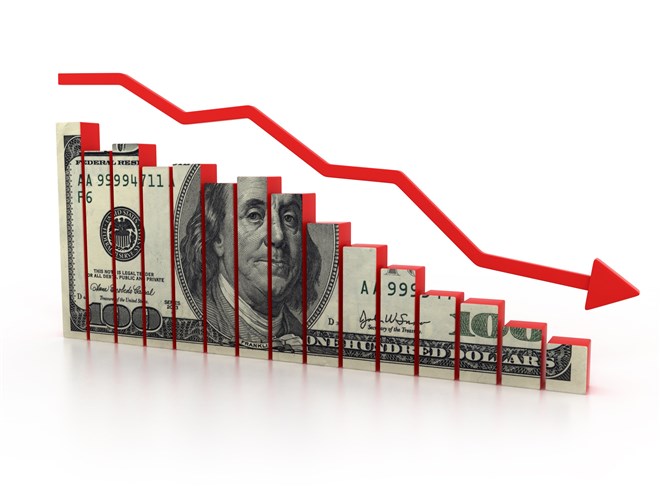
Inflation hit a 40-year high of 9.1% in June 2022. The acceleration of inflation prompted the U.S. Federal Reserve to implement monetary tightening to combat inflation. They aggressively raised interest rates seven times in 2022, hitting the high level in 15 years. This caused the stock market to collapse with extra pain in the technology sector. This also caused 10-year treasury yields to spike through 4%. The result of the aggressive interest rate hikes is showing up in the CPI data indicating inflation has fallen to 6.6%. Analysts continue to speculate when the Fed will slow down rate hikes and eventually pause them so the stock market can rally back.
The Fed is still targeting a 2% inflation rate. As a result of the Fed's actions, inflation is falling and, in some cases, may be falling too fast. Just as inflation acceleration was a problem on the way up, inflation deceleration is starting to rear its head in earnings results for certain consumer staples stocks, sometimes drastically, as normalization sets in.
What is Inflation Deceleration?
Inflation deceleration is the opposite of inflation acceleration. Rather than inflation rising too quickly, inflation falls sharply. While this is good for consumers, it can wreak havoc with businesses, producers and suppliers. Inflation deceleration calls for input calls to fall, which can be seen as good news for companies at first glance. Still, if the company's expectations have also been accelerated higher, then it can backfire.
How Inflation Deflation Hurts Stocks
Let's face it. As much as producers complain about rising input costs and inflation, the reality is that inflation enables many of them to pass the rising costs to the customers, helping bump up their margins and profits. This has been the case with consumer staples providers like food producers and grocery stores. They have been experiencing strong EPS growth due to rising inflation by marking up prices and passing them on to the customers. This has caused analysts to raise forecasts and expectations, assuming inflation will remain high and the business will maintain high margins even if volume drops.
Normalization eventually kicks in. As the Fed aggressively raises interest rates, inflation is falling back down. With it, earnings forecasts are also coming down for companies that enjoyed the benefit of high inflation. Consumer staples providers, notably food producers, suppliers, and distributors, must ratchet down their forecasts. With lowered expectations come lower stock prices as the economy normalizes. Inflation deflation can cause margin compression for food producers as they lower prices with falling input costs, improving volume and revenues but resulting in fewer profits.
United Natural Foods (35%) Stock Collapse
Food and grocery products producer United Natural Foods, Inc. (NASDAQ: UNFI) stock collapsed (35%) on its fiscal Q2 2023 earnings report. The company provides over 5,000 food products in over 200 categories to retailers and wholesalers. It dropped a bombshell, drastically lowering its full-year 2023 EPS guidance. United Foods reported fiscal Q2 2023 EPS of $0.78 per share versus $1.44 per share, missing by $0.66.
Revenues rose 5.4% to $7.82 billion beating $7.77 consensus estimates. GAAP net income fell (71.2%) to $19 million from $66 million in the year-ago period. Its GAAP EPS fell (71.3%) to $0.31. United Natural Foods cut its full-year 2023 EPS guidance to $3.05 to $3.90 versus $4.99 consensus analyst estimates. Revenues are expected between $30.1 to $30.5 billion versus $30.3 billion. It also withdrew its long-term fiscal 2024 forecasts.
CEO Sandy Douglas commented, "Profits were challenged as we did not repeat the significant level of procurement gains from rapidly accelerating inflation and inventory gains due to supply chain volatility that we experienced in the second quarter of last year."
CFO John Howard hit the nail on the head, “The largest drivers of this decline in gross profit rate were lower procurement and inventory gains resulting from, among several things, supply chain volatility and a deceleration in the sequential rate of inflation. Like other food distribution companies, a portion of our gross margin is derived from buying into known price increases. The quantity and amount of these increases decreased year over year, which provided less opportunity to improve gross profit rates.”
Sysco Corporation
As evidenced by United Natural Foods, food providers and suppliers will be affected by inflation deflation. Sysco Corporation (NYSE: SYY) is a significant food supplier and distributor in addition to cookware and kitchenware. The company supplies food to restaurants, schools, hospitals, hotels, caterers, and food service venues globally. The company lowered its fiscal full-year EPS to $4.00 to $4.15, from an earlier forecast of $4.09 to $4.39 versus $4.14 consensus analyst estimates. It reports its fiscal Q3 2023 earnings after the close on May 2, 2023.
